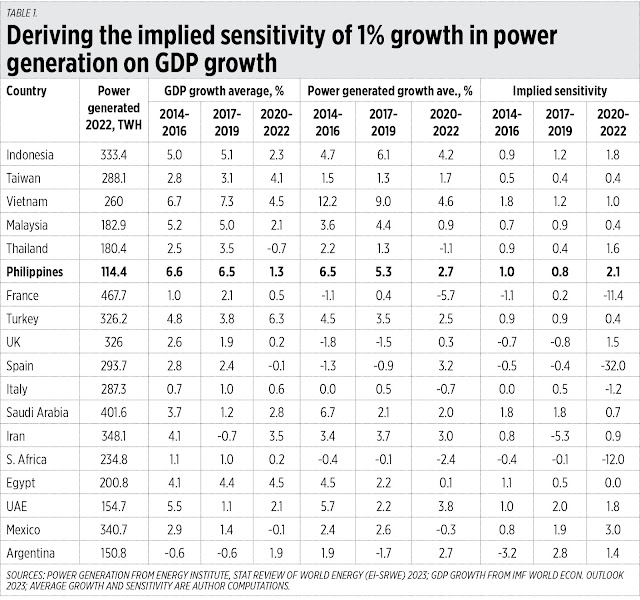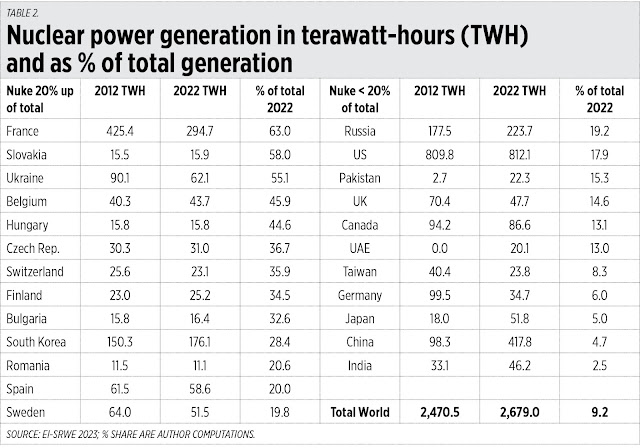https://www.bworldonline.com/opinion/2023/10/17/551802/energizing-growth-lessons-from-uae-france-and-other-countries/
(Part 2 of a series)
DUBAI, UAE — This is my first time setting foot in the Middle East. I am going to Nice, France for the Tholos Forum 2023. My sponsor booked me at Emirates Air so the route is Manila-Dubai-Nice and back.
From several videos and photos I had seen, Dubai is very bright at night, very developed and rich. I see this at the airport. Our plane landed at 4:30 a.m. and there are bright lights all around. The United Arab Emirates’ (UAE) power generation in 1985 was only 12.2 terawatt-hours (TWH) while Philippines’ was 22.8 TWH. By 2005, the UAE overtook the Philippines with 60.7 TWH while ours was 56.6 TWH. The UAE, along with Saudi Arabia, Qatar, and other Middle East countries, optimized their oil and gas reserves and kept exporting. They did not follow the climate lobby of “keep fossil fuels on the ground” and they are correct, world demand for fossil fuels will never decline.
SENSITIVITY OF GDP GROWTH FROM POWER GENERATION GROWTH
The UAE is also a good example of a country rapidly expanding its power generation which in turn prods more economic activities and higher GDP growth. In Table 1, I attempted to derive a “sensitivity” or responsiveness of 1% growth in power generation and its potential effect in GDP growth. I excluded countries with more than 500 terawatt-hours (TWH) in power generation in 2022 — China, India, South Korea, Japan, the US, Canada, Brazil, Germany — because they seem to be outliers.
For several countries, a 1% increase in power generation contributes to a 1%+ increase in GDP growth. Clear cases are Indonesia, Vietnam, the Philippines, Saudi Arabia, the UAE, Mexico, and Argentina. This does not hold for richer Asians, like Taiwan and Malaysia, and the Europeans as their power generation growth has slowed down in recent years.
There are many factors for a country’s fast or slow growth and power generation is just one of them — but it is a major contributor because most business and human activities require energy, especially from fossil fuels (land, sea, and air transportation; power generation, etc.).
The result shows that for many developing countries, there is a positive correlation between fast growth in power generation and fast GDP growth (see Table 1).
PANDESAL FORUM WITH ERC CHAIR
Last Friday, Oct. 13, I attended a special Pandesal Forum at Kamuning Bakery in Quezon City for columnists and editors. The lone guest was Energy Regulatory Commission (ERC) Chairperson and CEO Monalisa Dimalanta, and the moderator was Wilson Flores.
Ms. Dimalanta gave her usual clear and non-ambiguous explanation of issues related to electricity pricing, power security, grid stability, generation competition, distribution regulation, rural electrification, and related topics. For me the major takeaways from her talk were the following:
1. Power generation and supply are competitive; power transmission is a monopoly and easier to monitor; distribution is a geographical monopoly but there are many distributors (121 electric cooperatives or ECs and about 20 private corporate distribution utilities or DUs) and they make regulation more time consuming and complicated. I suggested that ultimately all ECs should become corporations with lots of mergers, with fewer DUs nationwide. She agreed.
2. The National Grid Corp. of the Philippines (better known as the NGCP) indeed has many delayed or uncompleted projects that until now contribute to yellow or red alerts and even occasional rotating blackouts. Penalizing it might help, but penalties do not really contribute to grid stability — the fines just go to the national treasury and not to the affected consumers. There is a need to address bureaucratic bottlenecks and the Energy Virtual One-Stop Shop law is a big help on this.
FRANCE AMBASSADOR VISITS DBM
My trip to France may not have been possible due to limited time between when the invite was sent to me and the trip itself. Good thing that my friend wrote to the France Ambassador to the Philippines, Her Excellency Marie Fontanel, and her office considered my case positively.
Last Friday, Ambassador Fontanel paid a courtesy visit to Department of Budget and Management (DBM) Secretary Amenah Pangandaman and other DBM officials. Their discussion covered diplomatic, trade and investment relations between the Philippines and France, especially on defense, agriculture, and infrastructure, among others. Good discussion between intelligent officials.
I hope that France will greatly help the Philippines develop our nuclear energy generation.
THOLOS FORUM, PANEL ON CLIMATE
The Tholos Forum 2023 is a three-day conference running from Oct. 16 to 18. On Day 3, a panel, “Climate is the key to global free market innovation and acceleration,” will feature Grover Norquist of the Americans for Tax Reforms (ATR) as one of the speakers. It will be moderated by Rod Richardson of the Grace Richardson Fund. I hope nuclear energy, including small modular reactors (SMR) and micro modular reactors (MMR), will be tackled.
The Philippines need to go into nuclear energy production because previous government policies have killed new “greenfield” coal power plants and allow only “brownfield” coal plants, but space will be limited. Meanwhile, the government and the climate lobby are pushing hard for intermittent and unreliable wind-solar power generation. Table 2 lists countries that the Philippines can use as inspiration for nuclear development, especially France and the UAE.
There is no climate crisis or climate emergency. There is only the natural climate cycle of warming-cooling-warming-cooling in multiple-year, even multiple-century cycles, ever since planet Earth was born some 4.6 billion years ago. What we do have is persistent economic deprivation for many people, and we need more energy production, both from conventional thermal plants and conventional renewables like hydro and geothermal, to help remedy this. Plus nuclear. Consumer freedom and choice should prevail when it comes to what type of energy source they will get based on their needs.
-----------
See also:
BWorld 645, Financing growth: Reducing interest payments and spending control, October 20, 2023
BWorld 646, Revisiting the lockdown, the role of CDC PH and Doc Iggy Agbayani, October 27, 2023
BWorld 647, Declining unemployment and the Tholos forum, October 28, 2023.



No comments:
Post a Comment